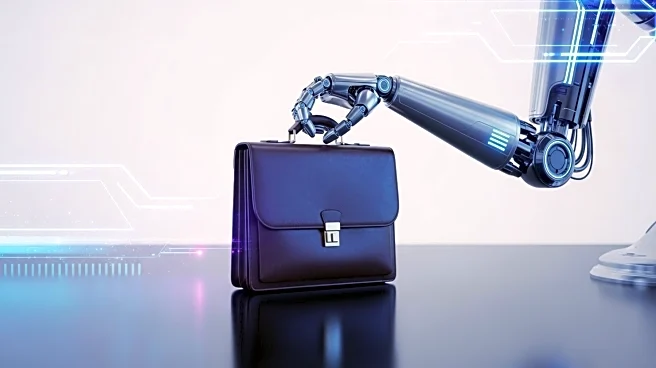What is the story about?
What's Happening?
OpenAI has published a paper titled 'Measuring the performance of our models on real-world tasks', which highlights 44 jobs most at risk of being replaced by AI technologies. The study utilized an assessment called GDPval to evaluate AI performance against human workers across nine major U.S. industries. The retail sector is particularly vulnerable, with AI outperforming counter and rental clerks in 81% of tasks, sales managers in 79%, and shipping, receiving, and inventory clerks in 76%. However, registered nurses were less affected, with AI surpassing them in only 37% of tasks. Government roles such as compliance officers and social workers were outperformed in 52% of tasks, while the information sector, including film directors and journalists, faced less risk, losing in just 39% of tasks. OpenAI CEO Sam Altman has expressed concern over job displacement, suggesting that AI could soon replace humans in certain roles, particularly in customer support.
Why It's Important?
The findings from OpenAI's study underscore the potential for significant disruption in the U.S. job market due to AI advancements. Industries such as retail and government services may face substantial changes, with many roles potentially being automated. This could lead to job losses and necessitate workforce retraining and adaptation. While some sectors may benefit from increased efficiency and productivity, others may struggle with the transition, impacting economic stability and employment rates. The study highlights the need for policymakers and industry leaders to address the challenges posed by AI integration, ensuring that workers are supported and that economic impacts are mitigated.
What's Next?
As AI technologies continue to evolve, industries will need to adapt to these changes. Companies may invest in AI to enhance productivity, potentially leading to further job displacement. Policymakers might consider implementing measures to support affected workers, such as retraining programs and educational initiatives. The broader societal impact of AI on employment will likely prompt discussions on regulatory frameworks and ethical considerations surrounding AI deployment. Stakeholders, including businesses, government agencies, and civil society groups, will need to collaborate to address these challenges and ensure a balanced approach to AI integration.
Beyond the Headlines
The ethical implications of AI replacing human jobs are significant, raising questions about the value of human labor and the societal role of work. As AI becomes more prevalent, there may be shifts in cultural attitudes towards employment and productivity. Long-term, this could lead to changes in economic structures and social norms, as well as discussions on universal basic income and other support mechanisms. The development and deployment of AI must be carefully managed to balance technological progress with human welfare.















